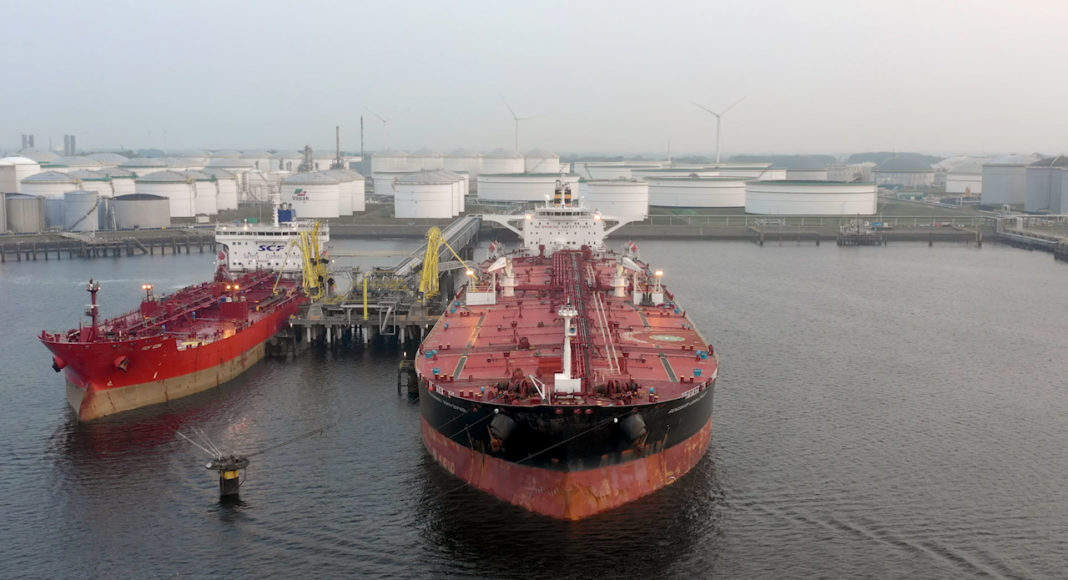(S&P Global Platts) After months of preaching caution and saying the time was not right to raise oil production, OPEC and its partners abruptly agreed on April 1 to loosen their quotas and add more than 2 million b/d into the market by July.
The move is a bet that the OPEC+ alliance can gradually reclaim some of its lost market share, even as the global economy faces an uneven recovery from the pandemic.
The increases will be phased in each month, and the alliance reserves the right to U-turn if market conditions deteriorate, Saudi energy minister Prince Abdulaziz bin Salman said. In fact, OPEC+ ministers are planning to meet again April 28 to review their decision, before the first increment goes into effect in May.
“The decision today is nothing more than to be willing to test our guts and test our system of tweaking and attending to the situation,” Prince Abdulaziz told reporters after the OPEC+ meeting.
The OPEC+ alliance will raise its collective output caps by 350,000 b/d in May, another 350,000 b/d in June, and 441,000 b/d in July.
At the same time, Saudi Arabia, which has been cutting an extra 1 million b/d on top of its quota to help bolster the market, will unwind it by 250,000 b/d in May, 350,000 b/d in June and 400,000 b/d in July.
The surprise decision still saw front-month Brent futures rise almost 4% to above $65/b in the wake of the meeting after choppy trading earlier in the day as OPEC+ members debated their options.
“We believe bullish balances with sequential draws in the second and third quarters will firm up prices, with alignment between strong fundamentals and reflation trade lifting crude to fresh highs of $75-$76/b Brent in June-July,” S&P Global Platts Analytics said in a note.
Notable phone calls
Going into the meeting, the consensus among analysts was that the alliance was headed for another rollover of its cuts, to keep the market tight, even at the risk of a supply squeeze as demand recovers.
In fact, a day before the meeting, a key OPEC+ technical committee said it was lowering its estimate of 2021 global oil demand growth by 5% to 5.6 million b/d from the previously forecast 5.9 million b/d.
And in his opening remarks to the OPEC+ meeting, Prince Abdulaziz urged his counterparts to stay disciplined in their mission to bring the market back to its pre-pandemic health.
“Until the evidence of recovery is undeniable, we should maintain this cautious stance,” he told his counterparts. “The global picture is far from even and the recovery is far from complete.”
But in perhaps a hint of what was to come, he also said the group would remain flexible and acknowledged that the market had gained “stable footing” due to the OPEC+ cuts to date.
While the US and UK are seeing positive results from their mass vaccinations, the EU was still struggling with rising COVID-19 infection rates, he noted.
“Steering the ship in these current conditions where different scenarios are playing out in various regions of the world requires a steady hand on the tiller,” he said. “It also requires flexibility and being responsive to market needs.”
Two conversations may have influenced the meeting.
Russian President Vladimir Putin and Saudi Crown Prince Mohammed bin Salman — the energy minister’s half-brother — conferred on the phone, according to the Kremlin, though the official readout of the call said they mostly discussed green energy, not oil.
And Prince Abdulaziz also spoke to US Energy Secretary Jennifer Granholm on the phone before the meeting, with Granholm tweeting that they agreed to “reaffirm the importance of international cooperation to ensure affordable and reliable sources of energy for consumers.”
Prince Abdulaziz, however, said that oil prices were not discussed in the call, which, too, was mostly focused on clean energy.
Pivoting in the meeting
Initially, OPEC+ ministers debated the length of a rollover. Algeria proposed a two-month extension of the current cuts, while other countries preferred one, sources involved in the talks said.
The UAE advocated a gradual easing of the cuts, but energy minister Suhail al-Mazrouei was not opposed to a one-month rollover, the sources said.
Then in a surprise move, Prince Abdulaziz polled the ministers on whether they would prefer to boost production, and the plan to phase in output over three months was presented.
Russia and Kazakhstan, which had already been granted modest rises in their quotas in previous months, would be allocated a smaller portion of the increase. The rest of each month’s increase will be divided up proportionally among the rest of the members, including Saudi Arabia, which would also pare back its extra cut.
Prince Abdulaziz said he still maintains a very cautious outlook, but the easing of the cuts was being done in a measured way that should not upset the market.
Middle Eastern domestic crude consumption should rise with air conditioning demand in the summer, so a chunk of Saudi Arabia’s returned production will not be exported, he said.
In addition, countries that have exceeded their quotas previously will be required to make so-called compensation cuts by September to make their compliance whole – a contentious issue that caused some tensions in the talks, sources said. The required compensation cuts total just above 3 million b/d.
Russian Deputy Prime Minister Alexander Novak said that even with the relaxed quotas, a global oil inventory overhang of about 50 million to 60 million barrels above the 2015-2019 targeted average should be eliminated within 2-3 months.
The oil market was currently in a 2 million b/d deficit, he said in the meeting.



